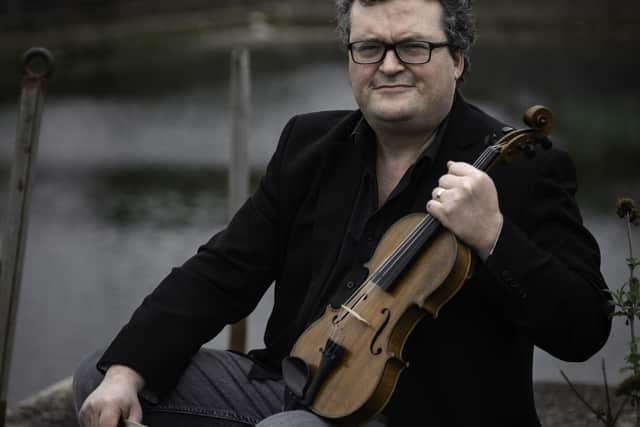Alastair Savage on new album Tunes From the River
Landscapes, sea and riverscapes overshadowed by tragedy, the richness of Scots fiddle tradition: all of these inform the very personal music of fiddler and composer Alastair Savage, but for his newest album, Tunes from the River, much of the music was also composed with other musicians in mind.
Savage is a musician who seems to straddle classical and traditional worlds with panache, his “day job” being with the BBC Scottish Symphony Orchestra. He is steeped in Scots fiddle music, however, and this sixth album, Tunes from the River (Woodland Records) is also the concluding part of a trilogy that started with his 2016 solo recording, Alone with History, and continued with When Barley Reaches Shore with longstanding collaborators guitarist-pianist Euan Drysdale and bassist Iain Crawford. It also reflects his well-received Fringe concerts in Edinburgh’s Canongate Kirk over the years, as well as performances elsewhere, and six of the new album’s 12 tracks were recorded live during these recitals.
Advertisement
Hide AdAdvertisement
Hide AdTunes from the River is launched on 24 September at a lunchtime concert in Paisley Abbey. Its opening Summer in Skye Suite begins with Hawk Hill, the kind of tender slow air his penchant for which recurs elsewhere in the album. He’s joined in the suite by another master fiddler, Perthshire’s Pete Clarke, illustrating his desire when planning the album to incorporate guest musicians whose playing he knows well.


Another musical friendship is with the composer and flautist Edward McGuire. In recent years the fiddler has played with him in the ranks of McGuire’s folk band, the Whistlebinkies, but the connection goes back much further. Savage, who grew up in Ayrshire, transferred from Ardrossan High School to Milngavie’s Douglas Academy and its music school, where a teacher, Jimmy Dunn, regularly commissioned pieces from McGuire. “So even when I was a teenager, I was talking to Eddie about music and playing a lot of his stuff,” recalls Savage, now 49.
The McGuire flute crops up in various tracks, not least the album’s title set, which opens with St Andrew’s Lament, which Savage wrote in response to 2013’s Clutha tragedy when a police helicopter plunged into a Clydeside bar, killing ten people. That piece was recorded in Glasgow’s St Bride’s Episcopal Church, with McGuire playing his way slowly from the back of the church to join the fiddler.
Another flautist, his BBC SSO colleague Ewan Robertson, plays on various tracks, joining Savage’s regular sidemen Drysdale and Crawford, while another Whistlebinkie member, piper Rab Wallace, plays smallpipes on The Rocks of Kilchoman, a lament Savage wrote to mark the centenary of the sinking of the troopship Otranto off Islay in 1918, when some 400 American servicemen died. He wrote it very much as a pipe lament, however: “I wasn’t hearing myself playing it so much as Rab playing it on pipes.”
Wallace, however, ribbed him that fiddlers only wanted pipers for playing laments, prompting Savage to compose the up-tempo Rab’s Rockin’ Reel. Savage also enlisted Finnish friends, Timo Alakotila and Vilma Timonen, the latter adding the glittering tones of the kantele, the Finnish zither.
Growing up in Ardrossan, he learned fiddle and guitar at home, his accordionist father taking him to the local strathspey and reel society at weekends while he was taught classical music at school. He might learn different ornamentation or bowing techniques at one class or the other, but he never found that problematic. “It’s only much later on when you go through music college and stuff [he studied at the Royal Scottish Academy of Music and Drama and the Royal Academy of Music in London] that people start regarding them as separate entities, but when you’re young you don’t think like that.
“Two of my first ever cassettes were of Yehudi Menuhin playing the Beethoven violin concerto and Ron Gonnella playing Gow and Scott Skinner, but I never thought of them as different worlds. I’ve just always looked on it as one big world of music.”
Tunes from the River is out now on Woodland Records, see www.scottishmusiccentre.com